Rachel Dodge's Blog
January 27, 2025
August 6, 2024
New Book: Eat Like a Heroine!
I’m ecstatic!!! Eat Like a Heroine is out today, Kindred Spirits!!
I’m so excited to share this book with all of you! And I’m so incredibly PROUD of my dear chums Jenny Williams @carrottoppapershop and Lorilee Craker @thebooksellersdaughter who have poured their hearts and souls into creating this beautiful book for us to savor.

“Join book-obsessed kindred spirits Jenny Williams and Lorilee Craker as they time travel through favorite heroine classics to glean all the foodie wisdom: How to eat, picnic, comfort, host and more like your best-loved bookish stars.
“Elevate your eating life to the level of Anne of Green Gables, Jane Austen, Maya Angelou and Zora Neale Hurston; come to the table with us as we learn how to eat like heroines.”

And my personal endorsement:
“Eat Like a Heroine invites readers to pull up a chair beside their favorite heroines and explore the foods prepared and eaten in an array of cherished classic books. I can’t wait to add this delectable new resource to my bookshelf!” -Rachel Dodge, author
Please join me in congratulating Lorilee and Jenny and forward this to all of your bosom friends who would love this beautiful book!
Here’s to eating like heroines, Kindred Spirits!
Rachel xx
Credit: Photos and illustrations by Jenny – of course!
Order Your Copy Here!
The post New Book: Eat Like a Heroine! first appeared on Rachel Dodge.
July 12, 2024
July in Jane Austen’s World
As the summer months continue in our month-by-month exploration of Jane Austen’s life, letters, and novels, we turn our attention to July in Jane Austen’s world. If you’re new to the series, you can find previous articles in this series here: January, February, March, April, May, and June.
Last month, we enjoyed the June roses at Chawton House Gardens. Let’s take a look at our monthly view for July! Can you imagine exploring the walled gardens on a warm summer day? I know two kids who did explore the gardens and the apple orchard (with permission) at Chawton House a few years ago!
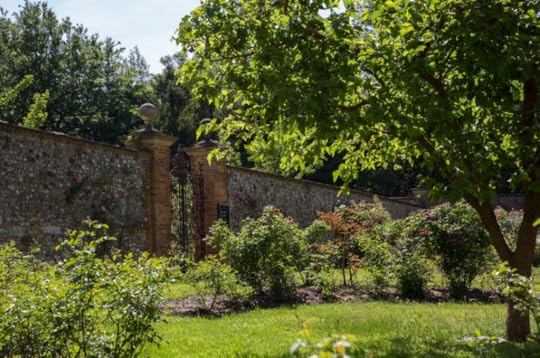 Chawton House in July: Photo @ChawtonHouse.July in Hampshire
Chawton House in July: Photo @ChawtonHouse.July in HampshireJuly in Hampshire brings sporadic heat waves, overcast days, sunny days, and frequent rain showers. The Austen women moved to Chawton in July 1809:
“On this day (7 July) in 1809 Jane Austen moved to Chawton to live in this house. It was here, in this inspiring cottage, that Jane’s genius flourished and where she wrote, revised, and had published all six of her globally beloved novels.” (Jane Austen’s House Museum)
 Jane Austen’s House in July, Photo: @JaneAustensHouse.July in Jane Austen’s Letters
Jane Austen’s House in July, Photo: @JaneAustensHouse.July in Jane Austen’s LettersWe don’t have as many of Jane’s letters from the month of July on record, though there is one funny aside that caught my attention as I searched through her letters. After complaining earlier to Cassandra about a few days of “cold disagreeable weather,” “fires every day,” and use of her “kerseymere spencer” for evening walks, Jane wrote the following on 1 July 1808: “The weather is mended, which I attribute to my writing about it…”
The fact is, however, that two of the most important letters we have from the month of July are not from Jane herself but from her sister Cassandra. And those, as many of you well know, are the letters Cassandra wrote to her niece Fanny Knight after Jane’s passing in July 1817.
Cassandra’s LettersCassandra’s letters, which many of you have read, are some of the most beautiful letters we have on record. Jane was Cassandra’s younger sister, but she was also her lifelong companion and best friend. Cassandra’s sorrow at losing one so dear is obvious in her writings.
In her first letter (18 July 1817), Cassandra tells Fanny about Jane’s last days and hours with delicacy, reverence, and love:
I have lost a treasure, such a sister, such a friend as never can have been surpassed. She was the sun of my life, the gilder of every pleasure, the soother of every sorrow; I had not a thought concealed from her, and it is as if I had lost a part of myself. I loved her only too well,—not better than she deserved, but I am conscious that my affection for her made me sometimes unjust to and negligent of others; and I can acknowledge, more than as a general principle, the justice of the Hand which has struck this blow.
You know me too well to be at all afraid that I should suffer materially from my feelings; I am perfectly conscious of the extent of my irreparable loss, but I am not at all overpowered and very little indisposed,—nothing but what a short time, with rest and change of air, will remove. I thank God that I was enabled to attend her to the last, and amongst my many causes of self-reproach I have not to add any wilful neglect of her comfort.
In her second letter (29 July 1817), Cassandra expresses to Fanny that she often thinks of Jane in Heaven and hopes she will one day be reunited with her there:
If I think of her less as on earth, God grant that I may never cease to reflect on her as inhabiting heaven, and never cease my humble endeavors (when it shall please God) to join her there.
As a lifelong lover of Jane Austen, I treasure Cassandra’s letters deeply, as I’m sure many of you do too. If you have not read her letters in a while, or if you wish to read them for the first time, you can find them HERE.
July in Jane Austen’s NovelsPride and Prejudice
July is when Elizabeth travels with Mr. and Mrs. Gardiner: “The time fixed for the beginning of their northern tour was now fast approaching; and a fortnight only was wanting of it, when a letter arrived from Mrs. Gardiner, which at once delayed its commencement and curtailed its extent. Mr. Gardiner would be prevented by business from setting out till a fortnight later in July, and must be in London again within a month; and as that left too short a period for them to go so far, and see so much as they had proposed, or at least to see it with the leisure and comfort they had built on, they were obliged to give up the Lakes, and substitute a more contracted tour; and, according to the present plan, were to go no farther northward than Derbyshire. In that county there was enough to be seen to occupy the chief of their three weeks; and to Mrs. Gardiner it had a peculiarly strong attraction. The town where she had formerly passed some years of her life, and where they were now to spend a few days, was probably as great an object of her curiosity as all the celebrated beauties of Matlock, Chatsworth, Dovedale, or the Peak.”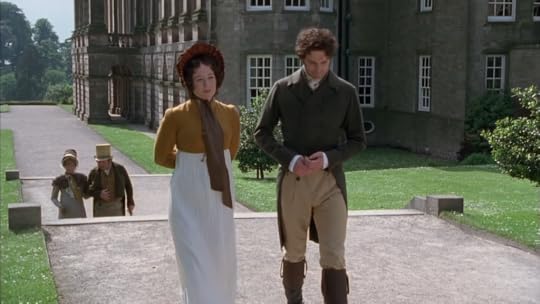 Elizabeth and Mr. Darcy, Mr. and Mrs. Gardiner
Elizabeth and Mr. Darcy, Mr. and Mrs. GardinerMansfield Park
Mr. and Miss Crawford come on the scene: “Such was the state of affairs in the month of July; and Fanny had just reached her eighteenth year, when the society of the village received an addition in the brother and sister of Mrs. Grant, a Mr. and Miss Crawford, the children of her mother by a second marriage. They were young people of fortune. The son had a good estate in Norfolk, the daughter twenty thousand pounds.”Emma
The night before Mr. Knightley returns from London, Emma spends a miserable evening wondering what will come of Harriet’s feelings (and her own feelings) toward Mr. Knightley: “The evening of this day was very long, and melancholy, at Hartfield. The weather added what it could of gloom. A cold stormy rain set in, and nothing of July appeared but in the trees and shrubs, which the wind was despoiling, and the length of the day, which only made such cruel sights the longer visible.”Emma’s thoughts that evening regarding the loss of Mr. Knightley, if he were to marry Harriet: “All that were good would be withdrawn; and if to these losses, the loss of Donwell were to be added, what would remain of cheerful or of rational society within their reach? Mr. Knightley to be no longer coming there for his evening comfort!—No longer walking in at all hours, as if ever willing to change his own home for theirs!—How was it to be endured?” Gwyneth Paltrow in Emma, 1997.
Gwyneth Paltrow in Emma, 1997.Persuasion
Sir Walter Elliot’s wedding day: “Walter Elliot, born March 1, 1760, married, July 15, 1784, Elizabeth, daughter of James Stevenson, Esq. of South Park, in the county of Gloucester, by which lady (who died 1800) he has issue Elizabeth, born June 1, 1785; Anne, born August 9, 1787; a still-born son, November 5, 1789; Mary, born November 20, 1791.”The letter Mrs. Smith produces from Mr. Elliot, written to “Charles Smith, Esq. Tunbridge Wells,” dated July 1803, reads as follows:“Dear Smith,
“I have received yours. Your kindness almost overpowers me. I wish nature had made such hearts as yours more common, but I have lived three-and-twenty years in the world, and have seen none like it. At present, believe me, I have no need of your services, being in cash again. Give me joy: I have got rid of Sir Walter and Miss. They are gone back to Kellynch, and almost made me swear to visit them this summer; but my first visit to Kellynch will be with a surveyor, to tell me how to bring it with best advantage to the hammer. The baronet, nevertheless, is not unlikely to marry again; he is quite fool enough. If he does, however, they will leave me in peace, which may be a decent equivalent for the reversion. He is worse than last year.
“I wish I had any name but Elliot. I am sick of it. The name of Walter I can drop, thank God! and I desire you will never insult me with my second W. again, meaning, for the rest of my life, to be only yours truly,
“WM. ELLIOT.”
 Samuel West at Mr. Elliot in Persuasion, 1995.July Dates of Importance
Samuel West at Mr. Elliot in Persuasion, 1995.July Dates of ImportanceThis brings us now to several important July dates that relate to Jane and her family:
Family News:
July–August 1768: The Austen family moves to Steventon, Hampshire.
3 July 1779: James Austen matriculates at St. John’s College, Oxford (BA 1783, MA 1788).
1 July 1788: Henry Austen matriculates at St. John’s College, Oxford (BA 1792, MA 1796).
2 July 1806: Mrs. Austen and her daughters leave Bath.
24 July 1806: Francis Austen marries Mary Gibson.
7 July 1809: Austen women and Martha Lloyd move to Chawton Cottage.
Historic Dates:
14 July 1789: Storming of the Bastille in Paris.
July 1793: Beginning of the Reign of Terror in France.
Writing:
July 1813: Austen (most likely) finishes Mansfield Park.
18 July 1816: Austen completes first draft of Persuasion.
Sorrows:
18 July 1817: Jane Austen dies, early in the morning, attended by her sister Cassandra.
24 July 1817: Jane Austen is buried in Winchester Cathedral.
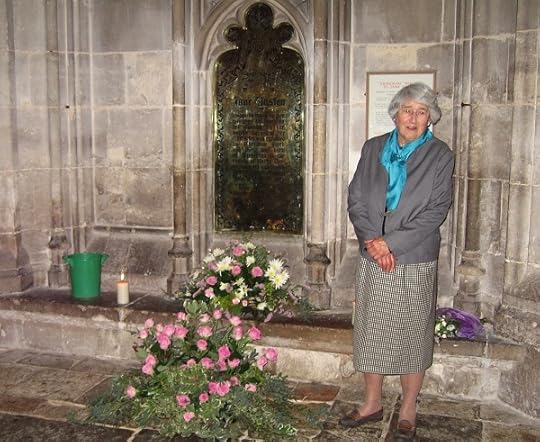 Helen LeFroy at a private JASNA ceremony at Jane Austen’s grave, Winchester Cathedral, 2007. Image @ Rachel Dodge.
Helen LeFroy at a private JASNA ceremony at Jane Austen’s grave, Winchester Cathedral, 2007. Image @ Rachel Dodge. Jane Austen’s Grave.July Beginnings and Endings
Jane Austen’s Grave.July Beginnings and EndingsIt’s interesting to note that Jane Austen moved to Chawton in July 1809 and passed away (in Winchester) in July 1817. Her years at Chawton Cottage are some of the most fruitful of all her writing career. From Jane Austen’s House Museum:
1811: Sense and Sensibility published.
1813: Pride and Prejudice published.
1814: Mansfield Park published.
1816: Emma published (December 1815).
1815 – 1816: Jane writes The Elliots (later published as Persuasion).
January 1817: Jane begins The Brothers (later published as Sanditon), but she only completes the first twelve chapters.
Though we wish Austen could have lived much longer, enjoyed her wonderful family, and written many more novels, it’s incredible to think that she was able to accomplish so much in just a few short years. I’m thankful that Austen enjoyed a season of joy and creativity at Chawton Cottage. She wrote happily there in the beloved Hampshire countryside of her youth.
RACHEL DODGE teaches college English classes, gives talks at libraries, teas, and book clubs, and writes for Jane Austen’s World blog. She is the bestselling author of The Little Women Devotional, The Anne of Green Gables Devotional and Praying with Jane: 31 Days Through the Prayers of Jane Austen. Now Available: The Secret Garden Devotional! You can visit Rachel online at www.RachelDodge.com.
The post July in Jane Austen’s World first appeared on Rachel Dodge.
June 13, 2024
June in Jane Austen’s World
As spring turns to summer on our month-by-month exploration of Jane Austen’s life, letters, and novels, we turn our attention to June in Jane Austen’s world. If you’re new to the series, you can find previous articles in this series here: January, February, March, April, and May.
Last month, we enjoyed the beauty of springtime coming to Chawton, along with the beautiful blooms of May. Let’s take a look at our monthly view of Chawton House Gardens. Many visitors will come tour the gardens over the next few months to enjoy the garden walks, see the house, and perhaps stay for tea.
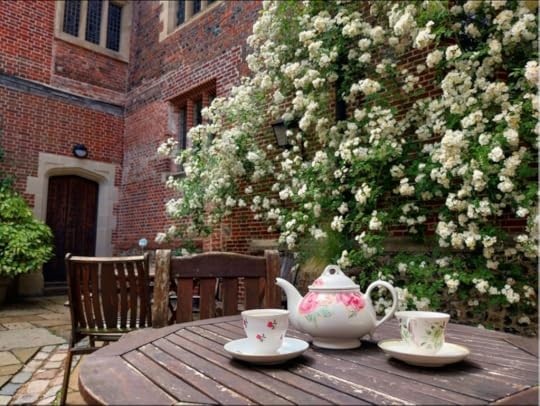 Chawton House in June: Photo @ChawtonHouse.June in Hampshire
Chawton House in June: Photo @ChawtonHouse.June in HampshireJune is the time of year when England turns into a beautiful garden of scenic greenery, lush fields, and lovely flowers. Hampshire is one of the prettiest places you can visit. I’ve been to Hampshire in the spring and early summer several times, and I highly recommend a summer trip if the opportunity ever presents itself. It’s also time for berries!
“Yesterday I had the agreable (sic) surprise of finding several scarlet strawberries quite ripe;- had you been at home, this would have been a pleasure lost. There are more Gooseberries & fewer Currants than I thought at first.- We must buy currants for our Wine.-” (Jane Austen writing to Cassandra from Chawton Cottage in June 1811)
Here is Jane Austen’s House Museum and the roses that frame the front door this time of year:
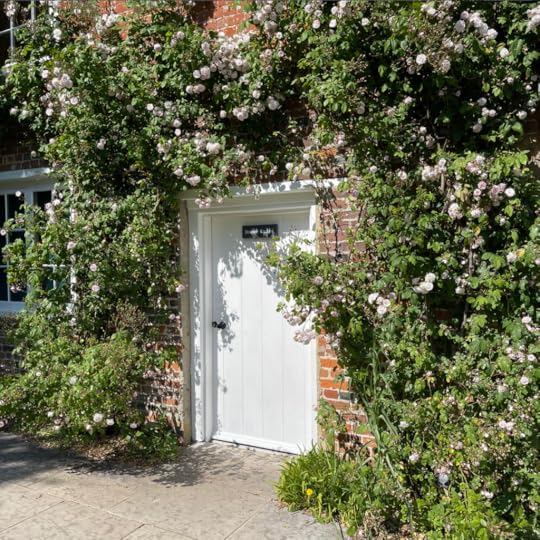 Jane Austen’s House in June, Photo: @JaneAustensHouse.June in Jane Austen’s Letters
Jane Austen’s House in June, Photo: @JaneAustensHouse.June in Jane Austen’s LettersWe have several letters from June to explore. After the “season” ended, many rich families left London and went to the countryside or Bath. Jane and her family frequently traveled to visit family members or friends for longer visits during the summer months.
2 June 1799 (Queen’s Square, Bath):
Edward’s health: “What must I tell you of Edward? Truth or falsehood? I will try the former, and you may choose for yourself another time. He was better yesterday than he had been for two or three days before,—about as well as while he was at Steventon. He drinks at the Hetling Pump, is to bathe to-morrow, and try electricity on Tuesday. He proposed the latter himself to Dr. Fellowes, who made no objection to it, but I fancy we are all unanimous in expecting no advantage from it. At present I have no great notion of our staying here beyond the month.”Visits with friends: “I spent Friday evening with the Mapletons, and was obliged to submit to being pleased in spite of my inclination. We took a very charming walk from six to eight up Beacon Hill, and across some fields, to the village of Charlecombe, which is sweetly situated in a little green valley, as a village with such a name ought to be. Marianne is sensible and intelligent; and even Jane, considering how fair she is, is not unpleasant. We had a Miss North and a Mr. Gould of our party; the latter walked home with me after tea. He is a very young man, just entered Oxford, wears spectacles, and has heard that ‘Evelina’ was written by Dr. Johnson.”Outings: “There is to be a grand gala on Tuesday evening in Sydney Gardens, a concert, with illuminations and fireworks. To the latter Elizabeth and I look forward with pleasure, and even the concert will have more than its usual charm for me, as the gardens are large enough for me to get pretty well beyond the reach of its sound. In the morning Lady Willoughby is to present the colors to some corps, or Yeomanry, or other, in the Crescent, and that such festivities may have a proper commencement, we think of going to….”11 June 1799 (Queen Square, Bath):
Taking the waters: “Edward has been pretty well for this last week, and as the waters have never disagreed with him in any respect, we are inclined to hope that he will derive advantage from them in the end. Everybody encourages us in this expectation, for they all say that the effect of the waters cannot be negative, and many are the instances in which their benefit is felt afterwards more than on the spot.”Thoughts on “First Impressions”: “I would not let Martha read ‘First Impressions’ again upon any account, and am very glad that I did not leave it in your power. She is very cunning, but I saw through her design; she means to publish it from memory, and one more perusal must enable her to do it.”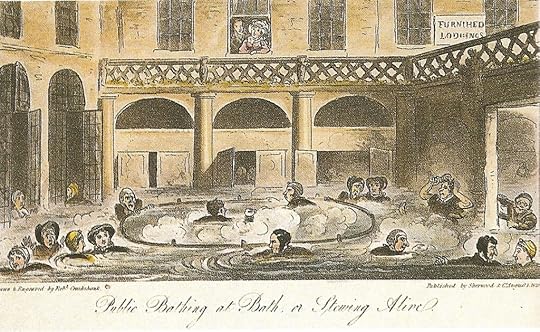 Public Domain Image.
Public Domain Image.15 June 1808 (Godmersham)
Details of their journey: “Which of all my important nothings shall I tell you first? At half after seven yesterday morning Henry saw us into our own carriage, and we drove away from the Bath Hotel; which, by the by, had been found most uncomfortable quarters,—very dirty, very noisy, and very ill-provided. James began his journey by the coach at five. Our first eight miles were hot; Deptford Hill brought to my mind our hot journey into Kent fourteen years ago; but after Blackheath we suffered nothing, and as the day advanced it grew quite cool.A rest for breakfast: “At Dartford, which we reached within the two hours and three-quarters, we went to the Bull, the same inn at which we breakfasted in that said journey, and on the present occasion had about the same bad butter. At half-past ten we were again off, and, travelling on without any adventure reached Sittingbourne by three. Daniel was watching for us at the door of the George, and I was acknowledged very kindly by Mr. and Mrs. Marshall, to the latter of whom I devoted my conversation, while Mary went out to buy some gloves. A few minutes, of course, did for Sittingbourne; and so off we drove, drove, drove, and by six o’clock were at Godmersham.”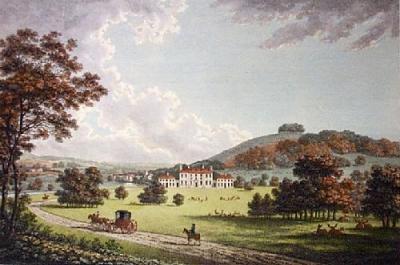 Godmersham Park
Godmersham Park25 April 1811 (Sloane St.)
Possible publishing date for Sense and Sensibility: “No, indeed, I am never too busy to think of S. and S. I can no more forget it than a mother can forget her sucking child; and I am much obliged to you for your inquiries. I have had two sheets to correct, but the last only brings us to Willoughby’s first appearance. Mrs. K. regrets in the most flattering manner that she must wait till May, but I have scarcely a hope of its being out in June. Henry does not neglect it; he has hurried the printer, and says he will see him again to-day. It will not stand still during his absence, it will be sent to Eliza.”6 June 1811 (Chawton)
New set of dishes: “On Monday I had the pleasure of receiving, unpacking, and approving our Wedgwood ware. It all came very safely, and upon the whole is a good match, though I think they might have allowed us rather larger leaves, especially in such a year of fine foliage as this. One is apt to suppose that the woods about Birmingham must be blighted. There was no bill with the goods, but that shall not screen them from being paid. I mean to ask Martha to settle the account. It will be quite in her way, for she is just now sending my mother a breakfast-set from the same place. I hope it will come by the wagon to-morrow; it is certainly what we want, and I long to know what it is like, and as I am sure Martha has great pleasure in making the present, I will not have any regret. We have considerable dealings with the wagons at present: a hamper of port and brandy from Southampton is now in the kitchen.”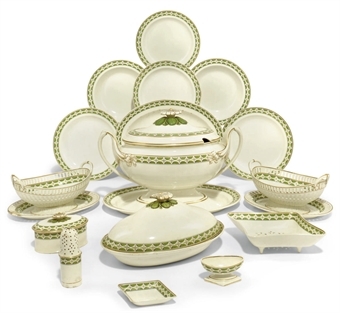 Wedgwood Queensware, c. 1790. Image @Christies
Wedgwood Queensware, c. 1790. Image @Christies13 June 1814 (Chawton)
Thoughts on Mansfield Park from Mr. and Mrs. Cooke: “In addition to their standing claims on me they admire “Mansfield Park” exceedingly. Mr. Cooke says “it is the most sensible novel he ever read,” and the manner in which I treat the clergy delights them very much. Altogether, I must go, and I want you to join me there when your visit in Henrietta St. is over. Put this into your capacious head.”23 June 1814 (Chawton):
Travels and plans: “I certainly do not wish that Henry should think again of getting me to town. I would rather return straight from Bookham; but if he really does propose it, I cannot say No to what will be so kindly intended. It could be but for a few days, however, as my mother would be quite disappointed by my exceeding the fortnight which I now talk of as the outside—at least, we could not both remain longer away comfortably.”Friends go to Clifton: “Instead of Bath the Deans Dundases have taken a house at Clifton—Richmond Terrace—and she is as glad of the change as even you and I should be, or almost. She will now be able to go on from Berks and visit them without any fears from heat.”23 June 1816 (Chawton)
Bits of news: “My dear Anna,—Cassy desires her best thanks for the book. She was quite delighted to see it. I do not know when I have seen her so much struck by anybody’s kindness as on this occasion. Her sensibility seems to be opening to the perception of great actions. These gloves having appeared on the pianoforte ever since you were here on Friday, we imagine they must be yours. Mrs. Digweed returned yesterday through all the afternoon’s rain, and was of course wet through; but in speaking of it she never once said “it was beyond everything,” which I am sure it must have been. Your mamma means to ride to Speen Hill to-morrow to see the Mrs. Hulberts, who are both very indifferent. By all accounts they really are breaking now,—not so stout as the old jackass.”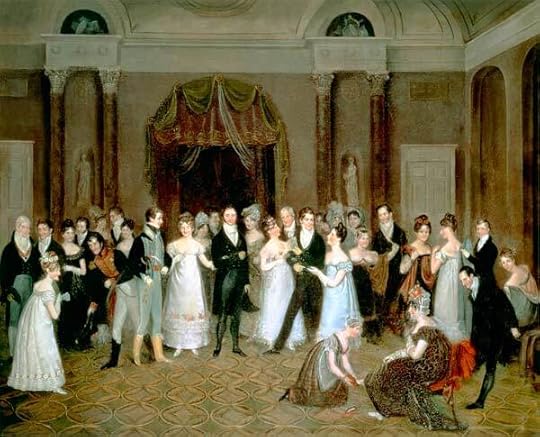 Rolinda Sharples’ Clifton Assembly Room (1817).June in Jane Austen’s Novels
Rolinda Sharples’ Clifton Assembly Room (1817).June in Jane Austen’s NovelsPride and Prejudice
Lady Catherine to Elizabeth: “Oh, your father, of course, may spare you, if your mother can. Daughters are never of so much consequence to a father. And if you will stay another month complete, it will be in my power to take one of you as far as London, for I am going there early in June, for a week; and as Dawson does not object to the barouche-box, there will be very good room for one of you—and, indeed, if the weather should happen to be cool, I should not object to taking you both, as you are neither of you large.”June at Longbourn after Lydia’s departure: After the first fortnight or three weeks of [Lydia’s] absence, health, good-humour, and cheerfulness began to reappear at Longbourn. Everything wore a happier aspect. The families who had been in town for the winter came back again, and summer finery and summer engagements arose. Mrs. Bennet was restored to her usual querulous serenity; and by the middle of June Kitty was so much recovered as to be able to enter Meryton without tears…Lydia born in June: “Well,” cried her mother, “it is all very right; who should do it but her own uncle? If he had not had a family of his own, I and my children must have had all his money, you know; and it is the first time we have ever had anything from him except a few presents. Well! I am so happy. In a short time, I shall have a daughter married. Mrs. Wickham! How well it sounds! And she was only sixteen last June. My dear Jane, I am in such a flutter, that I am sure I can’t write; so I will dictate, and you write for me. We will settle with your father about the money afterwards; but the things should be ordered immediately.”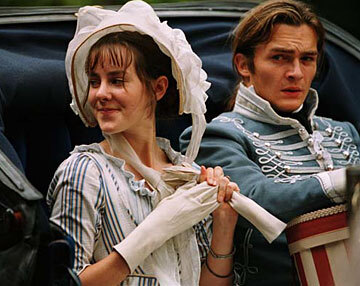 Happy Lydia and Unhappy Mr. Wickham
Happy Lydia and Unhappy Mr. WickhamMansfield Park
Edmund’s letter to Fanny: “I have sometimes thought of going to London again after Easter, and sometimes resolved on doing nothing till she returns to Mansfield. Even now, she speaks with pleasure of being in Mansfield in June; but June is at a great distance, and I believe I shall write to her. I have nearly determined on explaining myself by letter. To be at an early certainty is a material object. My present state is miserably irksome.”Emma
Happenings in Highbury: “In this state of schemes, and hopes, and connivance, June opened upon Hartfield. To Highbury in general it brought no material change. The Eltons were still talking of a visit from the Sucklings, and of the use to be made of their barouche-landau; and Jane Fairfax was still at her grandmother’s; and as the return of the Campbells from Ireland was again delayed, and August, instead of Midsummer, fixed for it, she was likely to remain there full two months longer, provided at least she were able to defeat Mrs. Elton’s activity in her service, and save herself from being hurried into a delightful situation against her will.”An outing delayed: “It was now the middle of June, and the weather fine; and Mrs. Elton was growing impatient to name the day, and settle with Mr. Weston as to pigeon-pies and cold lamb, when a lame carriage-horse threw every thing into sad uncertainty. It might be weeks, it might be only a few days, before the horse were useable; but no preparations could be ventured on, and it was all melancholy stagnation. Mrs. Elton’s resources were inadequate to such an attack.”Mr. Knightley offers his strawberry fields: “You had better explore to Donwell,” replied Mr. Knightley. “That may be done without horses. Come, and eat my strawberries. They are ripening fast.” Mr. and Mrs. Elton involved in everyone’s lives.
Mr. and Mrs. Elton involved in everyone’s lives.Persuasion
Elizabeth Elliot born: “Walter Elliot, born March 1, 1760, married, July 15, 1784, Elizabeth, daughter of James Stevenson, Esq. of South Park, in the county of Gloucester, by which lady (who died 1800) he has issue Elizabeth, born June 1, 1785; Anne, born August 9, 1787; a still-born son, November 5, 1789; Mary, born November 20, 1791.”A June sorrow: “And I am sure,” cried Mary, warmly, “it was a very little to his credit, if he did. Miss Harville only died last June. Such a heart is very little worth having; is it, Lady Russell? I am sure you will agree with me.”June Dates of ImportanceThis brings us now to several important June dates that relate to Jane and her family:
Family News:
8 June 1771: Henry Thomas Austen (Jane’s brother) born at Steventon.
23 June 1779: Charles Austen (Jane’s brother) born at Steventon.
18 June 1805: James Austen’s daughter, Caroline, born.
Historic Dates:
18 June 1812: The United States declares war on Great Britain (War of 1812).
18 June 1815: The Duke of Wellington defeats Napoleon at the Battle of Waterloo.
Writing:
3 June 1793: Jane Austen most likely writes the last item of her juvenilia.
June 1799: Austen most likely finishes Susan (Northanger Abbey).
Sorrows:
I’m happy to report that I found no major sorrows for the Austen family in the month of June throughout Austen’s lifetime.
 June 2024 @JaneAustensHouse.Joyful June
June 2024 @JaneAustensHouse.Joyful JuneThis concludes our June ramble through Jane Austen’s life, letters, and works. There is always something fascinating to explore! Next month, we’ll discover all the important dates and events from July in Jane Austen’s World. Until then, you might join the Jane Austen’s House Museum virtual book club! You can click here for more: https://janeaustens.house/visit/whats-on/.
The post June in Jane Austen’s World first appeared on Rachel Dodge.
May 16, 2024
Summer Reading! Every Time We Say Goodbye.
For those looking for a glamorous, post-WW2, historical fiction novel for spring and summer, I have great news for you! Natalie Jenner, the bestselling author of The Jane Austen Society and Bloomsbury Girls, is back with a new novel called Every Time We Say Goodbye!
If you fell in love with Jenner’s writing, storylines, and characters when you read her first two novels, then add this third installment to your TBR list. Though Jenner’s books can be read as stand-alone stories, they each tie to the others.
This time, we follow actress and playwright Vivien Lowry, one of the original (fictional) members of the Jane Austen Society, to 1950s, post-war Italy to pursue her film career.
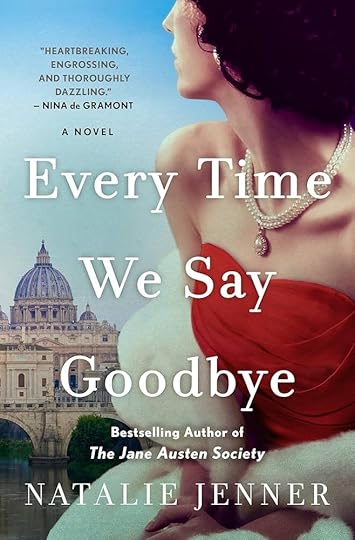 Book Details
Book DetailsThe bestselling author of The Jane Austen Society and Bloomsbury Girls returns with a brilliant novel of love and art, of grief and memory, of confronting the past and facing the future.
In 1955, Vivien Lowry is facing the greatest challenge of her life. Her latest play, the only female-authored play on the London stage that season, has opened in the West End to rapturous applause from the audience. The reviewers, however, are not as impressed as the playgoers and their savage notices not only shut down the play but ruin Lowry’s last chance for a dramatic career.
With her future in London not looking bright, at the suggestion of her friend, Peggy Guggenheim, Vivien takes a job in as a script doctor on a major film shooting in Rome’s Cinecitta Studios. There she finds a vibrant movie making scene filled with rising stars, acclaimed directors, and famous actors in a country that is torn between its past and its potentially bright future, between the liberation of the post-war cinema and the restrictions of the Catholic Church that permeates the very soul of Italy.
As Vivien tries to forge a new future for herself, she also must face the long-buried truth of the recent World War and the mystery of what really happened to her deceased fiancé. Every Time We Say Goodbye is a brilliant exploration of trauma and tragedy, hope and renewal, filled with dazzling characters both real and imaginary, from the incomparable author who charmed the world with her novels The Jane Austen Society and Bloomsbury Girls.
 Audiobook
AudiobookIf you prefer listening to your historical fiction, BAFTA Award-winning actress Juliet Aubrey has narrated the audiobook of Every Time We Say Goodbye.
“Aubrey won the BAFTA for her performance as the quintessential Dorothea Brooke in the BBC’s 1994 production of Middlemarch and has appeared in dozens of television, film, stage, and radio programs over her impressive career, most recently winning the BBC Audio Drama Award for Best Actress in 2022. Aubrey has a voice full of dusky cadence, emotion, and subtlety, and brings to the audiobook a mastery of dialect and intonation.”

I highly recommend listening to this one! I’ve been listening, and I love the play between the English, American, and Italian accents. You can listen to an excerpt from the audiobook for Every Time We Say Goodbye here:
Every Time We Say Goodbye by Natalie Jenner, audiobook excerpt [Chapter Three] by MacmillanAudio (soundcloud.com) Order Your CopyEvery Time We Say Goodbye releases May 14, 2024. You can purchase the book online or in any of your local retail bookshops. If you’d like a hardcover copy, the details are below:
Order HERE
One of Bookbub’s Best Historical Fiction Books for Spring!
One of the CBC’s Most Anticipated Canadian Novels this Spring!
“Jenner provides an insightful view into Italy’s postwar reckoning, and she imbues the novel’s many celebrity cameos – including actresses Sophia Loren and Gina Lollobrigida―with authentic flair. Jenner’s fans will love this.” ―Publishers Weekly
“With warmth and compassion…lush descriptions, vivid period detail, and fascinating personalities, Jenner’s cinematic narrative is shot through with both pain and hope.” ―Shelf Awareness
 About the Author
About the AuthorNATALIE JENNER is the author of the international bestseller The Jane Austen Society and Bloomsbury Girls. A Goodreads Choice Award runner-up for historical fiction and finalist for best debut novel, The Jane Austen Society was a USA Today and #1 national bestseller, and has been sold for translation in twenty countries.

Born in England and raised in Canada, Natalie has been a corporate lawyer, career coach and, most recently, an independent bookstore owner in Oakville, Ontario, where she lives with her family and two rescue dogs. Visit her website for more.
Jane Austen News from NatalieFinally, it’s my great joy to announce that Natalie has a 4th upcoming novel slated for 2025, tentatively titled Austen at Sea, just in time for Jane Austen’s 250th celebration!
This new novel, once again about Austen’s fans, is set in 1865 Boston and Hampshire. Here’s a brief introduction:
“In Austen at Sea, Henrietta and Charlotte Stevenson, the only children of a widowed Massachusetts supreme court judge, are desperate to experience freedom of any kind, at a time when young unmarried women are kept largely at home. Striking up a correspondence with Jane Austen’s last surviving sibling, ninety-one-year-old retired admiral Sir Francis Austen, the two sisters invite themselves to visit and end up sneaking on board the S. S. China, a transatlantic mail packet steamship heading to Portsmouth.”
The post Summer Reading! Every Time We Say Goodbye. first appeared on Rachel Dodge.
May in Jane Austen’s World
As spring turns to summer on our month-by-month exploration of Jane Austen’s life, letters, and novels, we turn our attention to May in Jane Austen’s world. If you’re just jumping on the bus, you can find previous articles in this series here: January, February, March, and April.
During last month’s April showers in England, we dreamed of May flowers…and the Hampshire countryside certainly is showing some May flower power. First up, our monthly view of Chawton House Gardens. It certainly is bursting with color!
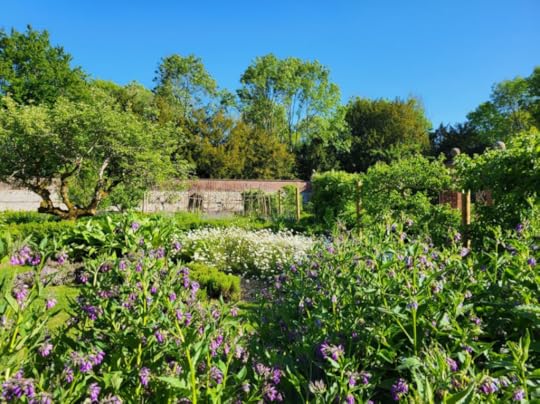 Chawton House in May: Photo @ChawtonHouse.May in Hampshire
Chawton House in May: Photo @ChawtonHouse.May in HampshireMay is the time of year when the sun shines more regularly and everything bursts into bloom. Summer is close at hand, which means the temperatures are starting to warm up a bit, but frequent rain helps keep the gardens cool and watered. Austen had this to say in May 1811 in a letter to Cassandra:
The chickens are all alive and fit for the table, but we save them for something grand. Some of the flower seeds are coming up very well, but your mignonette makes a wretched appearance. Miss Benn has been equally unlucky as to hers. She had seed from four different people, and none of it comes up. Our young piony (sic) at the foot of the fir-tree has just blown and looks very handsome, and the whole of the shrubbery border will soon be very gay with pinks and sweet-williams, in addition to the columbines already in bloom. The syringas, too, are coming out. We are likely to have a great crop of Orleans plums, but not many greengages—on the standard scarcely any, three or four dozen, perhaps, against the wall. (Chawton, Wednesday May 29, 1811)
Here is a glimpse of Jane Austen’s House Museum and its blooms this month.
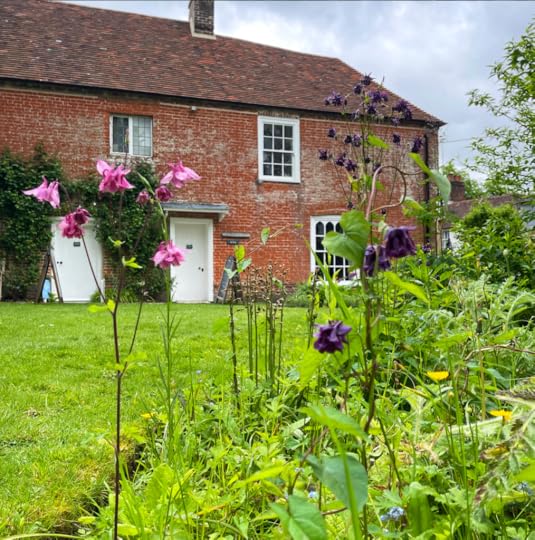 Jane Austen’s House in May, Photo: @JaneAustensHouse.May in Jane Austen’s Letters
Jane Austen’s House in May, Photo: @JaneAustensHouse.May in Jane Austen’s LettersWe have several letters from May to peruse. Interestingly, several are written from Bath. In an interesting article entitled “A Brief History of Jane Austen in Bath” on VisitBath.com, we read this about Jane Austen:
While many assume that Jane’s connection with Bath began when she moved to 4 Sydney Place in 1801 after her father’s retirement, the Austen family’s history with the City actually dates back further. Jane’s parents were married at St Swithin’s Church in 1764, and Jane herself visited in 1797 and 1799, lodging with her mother and sister-in-law at 13 Queen Square in 1799 while her brother took the waters for his health. Before moving into Sydney Place, she also stayed with her aunt and uncle, the Leigh-Perrots, at No.1 The Paragon. These short visits had a lasting impact on the young Jane Austen, inspiring her to write Northanger Abbey about Catherine Morland’s first visit to Bath and her “eager delight” at all it offered. (VisitBath.com)
May 17, 1799 (Queen’s Square):
Jane’s thoughts on the house: “We are exceedingly pleased with the house; the rooms are quite as large as we expected. Mrs. Bromley is a fat woman in mourning, and a little black kitten runs about the staircase. Elizabeth has the apartment within the drawing-room; she wanted my mother to have it, but as there was no bed in the inner one, and the stairs are so much easier of ascent, or my mother so much stronger than in Paragon as not to regard the double flight, it is settled for us to be above, where we have two very nice-sized rooms, with dirty quilts and everything comfortable. I have the outward and larger apartment, as I ought to have; which is quite as large as our bedroom at home, and my mother’s is not materially less. The beds are both as large as any at Steventon, and I have a very nice chest of drawers and a closet full of shelves — so full indeed that there is nothing else in it, and it should therefore be called a cupboard rather than a closet, I suppose.”Happy and content, despite a delay with her trunk: “I find no difficulty in closing my eyes. I like our situation very much; it is far more cheerful than Paragon, and the prospect from the drawing-room window, at which I now write, is rather picturesque, as it commands a prospective view of the left side of Brock Street, broken by three Lombardy poplars in the garden of the last house in Queen’s Parade.” The Royal Crescent in Spring (Photo Courtesy of VisitBath.com).
The Royal Crescent in Spring (Photo Courtesy of VisitBath.com).May 1801 (Paragon):
May 5 (their journey): “I have the pleasure of writing from my own room up two pair of stairs, with everything very comfortable about me. Our journey here was perfectly free from accident or event; we changed horses at the end of every stage, and paid at almost every turn-pike. We had charming weather, hardly any dust, and were exceedingly agreeable, as we did not speak above once in three miles. Between Luggershall and Everley we made our grand meal, and then with admiring astonishment perceived in what a magnificent manner our support had been provided for. We could not with the utmost exertion consume above the twentieth part of the beef. The cucumber will, I believe, be a very acceptable present, as my uncle talks of having inquired the price of one lately, when he was told a shilling.Food prices: “I am not without hopes of tempting Mrs. Lloyd to settle in Bath; meat is only 8d. per pound, butter 12d., and cheese 9 1/2 d. You must carefully conceal from her, however, the exorbitant price of fish: a salmon has been sold at 2s. 9d. per pound the whole fish. The Duchess of York’s removal is expected to make that article more reasonable — and till it really appears so, say nothing about salmon.”New bonnets: “My mother has ordered a new bonnet, and so have I; both white strip, trimmed with white ribbon. I find my straw bonnet looking very much like other people’s, and quite as smart. Bonnets of cambric muslin on the plan of Lady Bridges’ are a good deal worn, and some of them are very pretty; but I shall defer one of that sort till your arrival.” The Paragon from TravelpodMay 12 (a ball): “In the evening, I hope you honoured my toilette and ball with a thought; I dressed myself as well as I could, and had all my finery much admired at home. By nine o’clock my uncle, aunt, and I entered the rooms, and linked Miss Winstone on to us. Before tea it was rather a dull affair; but then the before tea did not last long, for there was only one dance, danced by four couple. Think of four couple, surrounded by about an hundred people, dancing in the Upper Rooms at Bath. After tea we cheered up; the breaking up of private parties sent some scores more to the ball, and though it was shockingly and inhumanly thin for this place, there were people enough, I suppose, to have made five or six very pretty Basingstoke assemblies.”The sale of their belongings: “I thank you for your Sunday’s letter, it is very long and very agreeable. I fancy you know many more particulars of our sale than we do; we have heard the price of nothing but the cows, bacon, hay, hops, tables, and my father’s chest of drawers and study table. Mary is more minute in her account of their own gains than in ours; probably being better informed in them. I will attend to Mrs. Lloyd’s commission and to her abhorrence of musk when I write again.”
The Paragon from TravelpodMay 12 (a ball): “In the evening, I hope you honoured my toilette and ball with a thought; I dressed myself as well as I could, and had all my finery much admired at home. By nine o’clock my uncle, aunt, and I entered the rooms, and linked Miss Winstone on to us. Before tea it was rather a dull affair; but then the before tea did not last long, for there was only one dance, danced by four couple. Think of four couple, surrounded by about an hundred people, dancing in the Upper Rooms at Bath. After tea we cheered up; the breaking up of private parties sent some scores more to the ball, and though it was shockingly and inhumanly thin for this place, there were people enough, I suppose, to have made five or six very pretty Basingstoke assemblies.”The sale of their belongings: “I thank you for your Sunday’s letter, it is very long and very agreeable. I fancy you know many more particulars of our sale than we do; we have heard the price of nothing but the cows, bacon, hay, hops, tables, and my father’s chest of drawers and study table. Mary is more minute in her account of their own gains than in ours; probably being better informed in them. I will attend to Mrs. Lloyd’s commission and to her abhorrence of musk when I write again.”
 Fancy Ball at the Upper Rooms, Bath, Thomas RowlandsonMay 21 – the search for apartments continues: “Our views on G. P. Buildings seem all at an end; the observation of the damps still remaining in the offices of an house which has been only vacated a week, with reports of discontented families and putrid fevers, has given the coup de grace. We have now nothing in view. When you arrive, we will at least have the pleasure of examining some of these putrefying houses again; they are so very desirable in size and situation, that there is some satisfaction in spending ten minutes within them.”Walking with Mrs. Chamberlayne: “It would have amused you to see our progress. We went up by Sion Hill, and returned across the fields. In climbing a hill Mrs. Chamberlayne is very capital; I could with difficulty keep pace with her, yet would not flinch for the world. On plain ground I was quite her equal. And so we posted away under a fine hot sun, she without any parasol or any shade to her hat, stopping for nothing, and crossing the churchyard at Weston with as much expedition as if we were afraid of being buried alive. After seeing what she is equal to, I cannot help feeling a regard for her. As to agreeableness, she is much like other people.”On a small party: “We are to have a tiny party here to-night. I hate tiny parties, they force one into constant exertion. Miss Edwards and her father, Mrs. Busby and her nephew, Mr. Maitland, and Mrs. Lillingstone are to be the whole; and I am prevented from setting my black cap at Mr. Maitland by his having a wife and ten children.”
Fancy Ball at the Upper Rooms, Bath, Thomas RowlandsonMay 21 – the search for apartments continues: “Our views on G. P. Buildings seem all at an end; the observation of the damps still remaining in the offices of an house which has been only vacated a week, with reports of discontented families and putrid fevers, has given the coup de grace. We have now nothing in view. When you arrive, we will at least have the pleasure of examining some of these putrefying houses again; they are so very desirable in size and situation, that there is some satisfaction in spending ten minutes within them.”Walking with Mrs. Chamberlayne: “It would have amused you to see our progress. We went up by Sion Hill, and returned across the fields. In climbing a hill Mrs. Chamberlayne is very capital; I could with difficulty keep pace with her, yet would not flinch for the world. On plain ground I was quite her equal. And so we posted away under a fine hot sun, she without any parasol or any shade to her hat, stopping for nothing, and crossing the churchyard at Weston with as much expedition as if we were afraid of being buried alive. After seeing what she is equal to, I cannot help feeling a regard for her. As to agreeableness, she is much like other people.”On a small party: “We are to have a tiny party here to-night. I hate tiny parties, they force one into constant exertion. Miss Edwards and her father, Mrs. Busby and her nephew, Mr. Maitland, and Mrs. Lillingstone are to be the whole; and I am prevented from setting my black cap at Mr. Maitland by his having a wife and ten children.”
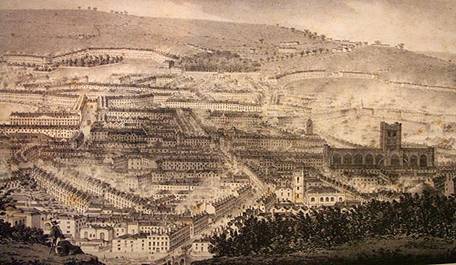 Panorama of Bath from Beechen Cliff, 1824, Harvey Wood
Panorama of Bath from Beechen Cliff, 1824, Harvey WoodJane wrote several other “May letters” from Chawton (1811) and Sloane Street (1813):
May 29, 1811 (Chawton):
Springtime storms: “Mrs. Terry, Mary, and Robert, with my aunt Harding and her daughter, came from Dummer for a day and a night,—all very agreeable and very much delighted with the new house and with Chawton in general. We sat upstairs, and had thunder and lightning as usual. I never knew such a spring for thunderstorms as it has been. Thank God! we have had no bad ones here. I thought myself in luck to have my uncomfortable feelings shared by the mistress of the house, as that procured blinds and candles. It had been excessively hot the whole day.”Improvements: “The chimneys at the Great House are done. Mr. Prowting has opened a gravel-pit, very conveniently for my mother, just at the mouth of the approach to his house; but it looks a little as if he meant to catch all his company. Tolerable gravel.”May 20, 1813 (Sloane Street):
Travels: “We left Guildford at twenty minutes before twelve (I hope somebody cares for these minutiæ), and were at Esher in about two hours more. I was very much pleased with the country in general. Between Guildford and Ripley I thought it particularly pretty, also about Painshill; and from a Mr. Spicer’s grounds at Esher, which we walked into before dinner, the views were beautiful. I cannot say what we did not see, but I should think there could not be a wood, or a meadow, or palace, or remarkable spot in England that was not spread out before us on one side or other.”Settling in: “I fancy it was about half-past six when we reached this house,—a twelve hours’ business, and the horses did not appear more than reasonably tired. I was very tired too, and glad to get to bed early, but am quite well to-day. I am very snug in the front drawing-room all to myself, and would not say “thank you” for any company but you. The quietness of it does me good.”May 24, 1813 (Sloane Street):
On visiting an exhibition and finding the Mrs. Bingley’s (Jane Bennet’s) likeness and looking for Mrs. Darcy’s (Elizabeth Bennet’s) likeness: “…to my great amusement, Henry and I went to the exhibition in Spring Gardens. It is not thought a good collection, but I was very well pleased, particularly (pray tell Fanny) with a small portrait of Mrs. Bingley, excessively like her. I went in hopes of seeing one of her sister, but there was no Mrs. Darcy. Perhaps, however, I may find her in the great exhibition, which we shall go to if we have time. I have no chance of her in the collection of Sir Joshua Reynolds’s paintings, which is now showing in Pall Mall, and which we are also to visit. Mrs. Bingley’s is exactly herself,—size, shaped face, features, and sweetness; there never was a greater likeness. She is dressed in a white gown, with green ornaments, which convinces me of what I had always supposed, that green was a favorite color with her. I dare say Mrs. D. will be in yellow.”Later that evening, on searching for Mrs. D (Elizabeth Bennet): “We have been both to the exhibition and Sir J. Reynolds’s, and I am disappointed, for there was nothing like Mrs. D. at either. I can only imagine that Mr. D. prizes any picture of her too much to like it should be exposed to the public eye. I can imagine he would have that sort of feeling,—that mixture of love, pride, and delicacy.” Jane Bennet, Pride and Prejudice (1995).May in Jane Austen’s Novels
Jane Bennet, Pride and Prejudice (1995).May in Jane Austen’s NovelsMay isn’t mentioned too terribly much in Austen’s novels, but it is a special point of interest and conversation in Emma because of the timing of Frank Churchill’s visit and the timing of the ball:
Emma
Frank’s visit: “Emma heard that Frank wrote in the highest spirits of this arrangement, and seemed most fully to appreciate the blessing of having two months before him of such near neighbourhood to many dear friends—for the house was taken for May and June. She was told that now he wrote with the greatest confidence of being often with them, almost as often as he could even wish.”Mr. Weston’s joy: “Mr. Weston’s own happiness was indisputable. He was quite delighted. It was the very circumstance he could have wished for. Now, it would be really having Frank in their neighbourhood. What were nine miles to a young man?—An hour’s ride. He would be always coming over.“A ball: “Mr. Weston’s ball was to be a real thing. A very few to-morrows stood between the young people of Highbury and happiness.”May is better for everything: “Mr. Woodhouse was resigned. The time of year lightened the evil to him. May was better for every thing than February.”Evening fire in May: “The whole party walked about, and looked, and praised again; and then, having nothing else to do, formed a sort of half-circle round the fire, to observe in their various modes, till other subjects were started, that, though May, a fire in the evening was still very pleasant.“ Anya Taylor-Joy (left) as “Emma Woodhouse” and Callum Turner (right) as “Frank Churchilll.” (2020). Credit : Focus Features.May Dates of Importance
Anya Taylor-Joy (left) as “Emma Woodhouse” and Callum Turner (right) as “Frank Churchilll.” (2020). Credit : Focus Features.May Dates of ImportanceThis brings us now to several important May dates that relate to Jane and her family:
Family News:
May 1801: Austen family leaves Steventon and settles in Bath. Mrs. Austen and Jane travel via Ibthorpe. James Austen and his family take resident at Steventon rectory.
May 1807: Captain Charles Austen marries Fanny Palmer in Bermuda.
Historic Dates:
18 May 1804: Napoleon crowns himself emperor of France.
Writing:
May 1814: Mansfield Park published anonymously, “By the Author of ‘Sense & Sensibility,’ and ‘Pride & Prejudice.’
Sorrows:
24 May 1817: Jane leaves Chawton and moves with Cassandra to Winchester, for medical treatment.
On this day in 1817, Jane Austen left this house for the final time. She went to stay in Winchester, closer to her doctor, where she died two months later, on 18 July. -Jane Austen’s House Museum
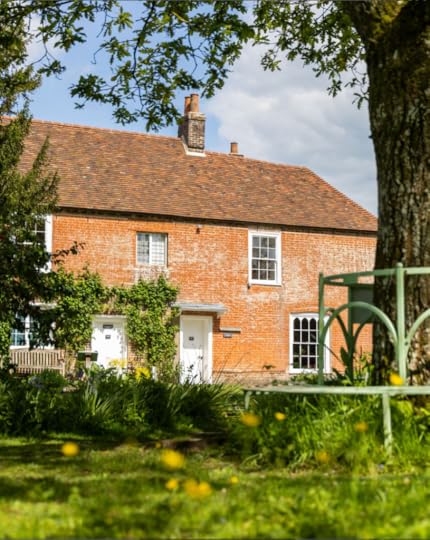 May 24, 2024 @JaneAustensHouseLovely May
May 24, 2024 @JaneAustensHouseLovely MayI hope you’re enjoying our journey through each month of the year in Jane Austen’s world. It is a joy to look through this lens into Austen’s life and letters. Next month, we’ll continue our exploration and find out what happened in Jane Austen’s world in June!
The post May in Jane Austen’s World first appeared on Rachel Dodge.
April 10, 2024
April in Jane Austen’s World
As we continue our month-by-month journey through Jane Austen’s novels, letters, and lifetime, we find ourselves in the lovely month of April! If you’re just jumping on the bus, you can find previous articles in this series here: January, February, and March.
Let’s see what we find as we explore April in Jane Austen’s World!
First up, our monthly view of Chawton House and Gardens, where the tulips are beginning to bloom!
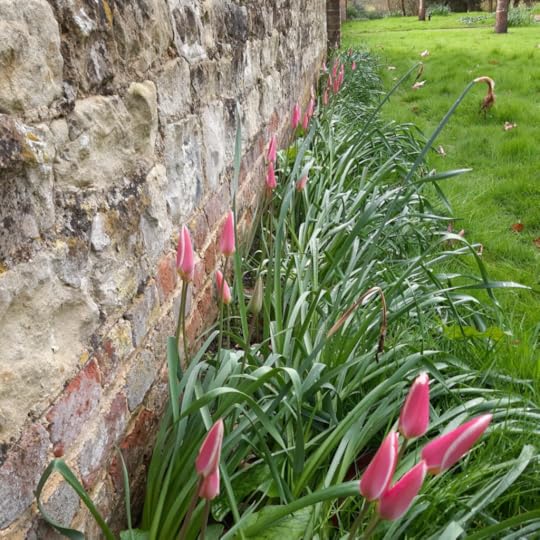 Chawton House in April, Photo: @ChawtonHouse.April in Hampshire
Chawton House in April, Photo: @ChawtonHouse.April in HampshireApril is when everything starts to come back to life and bloom in Hampshire. The trees boast new leaves, the roads and lanes are lined with green, and flowers and trees are in blossom. The weather ranges from cloudy to partly cloudy to partly sunny to rainy.
Why talk about the flowers and the weather? Because it’s fun to picture some of the details about Hampshire that Austen loved and that we can still enjoy today!
The badness of the weather disconcerted an excellent plan of mine,—that of calling on Miss Beckford again; but from the middle of the day it rained incessantly.Letter to Cassandra, Sloane St., Thursday (April 18, 1811)
Your lilacs are in leaf, ours are in bloom. The horse-chestnuts are quite out, and the elms almost. I had a pleasant walk in Kensington Gardens on Sunday with Henry, Mr. Smith, and Mr. Tilson; everything was fresh and beautiful.Letter to Cassandra, Sloane St., Thursday (April 25, 1811)
Here is a glimpse of Jane Austen’s House Museum this month. The garden is looking absolutely lovely already!
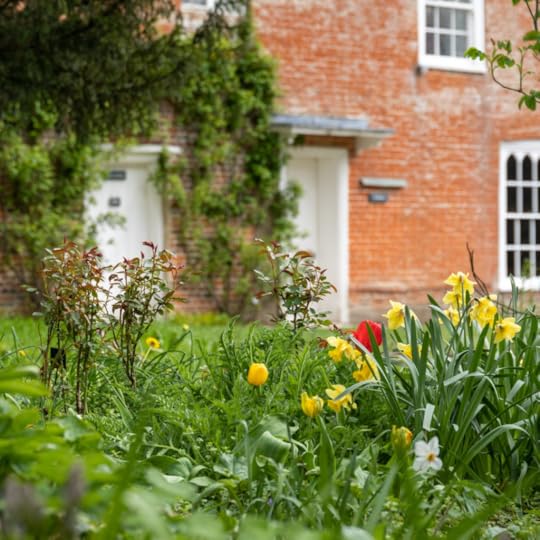 Jane Austen’s House in April, Photo: @JaneAustensHouse.April in Jane Austen’s Letters
Jane Austen’s House in April, Photo: @JaneAustensHouse.April in Jane Austen’s LettersWe have two letters from April 1811 when Jane was staying with her brother in Sloane Street in London. The following are a few excerpts of special interest:
April 18, 1811 Letter: Sloane Street
Her spring shopping purchases: “I am sorry to tell you that I am getting very extravagant, and spending all my money, and, what is worse for you, I have been spending yours too; for in a linendraper’s shop to which I went for checked muslin, and for which I was obliged to give seven shillings a yard, I was tempted by a pretty-coloured muslin, and bought ten yards of it on the chance of your liking it; but, at the same time, if it should not suit you, you must not think yourself at all obliged to take it; it is only 3s. 6d. per yard, and I should not in the least mind keeping the whole. In texture it is just what we prefer, but its resemblance to green crewels, I must own, is not great, for the pattern is a small red spot. And now I believe I have done all my commissions except Wedgwood.”More walking and shopping: “I liked my walk very much; it was shorter than I had expected, and the weather was delightful. We set off immediately after breakfast, and must have reached Grafton House by half-past 11; but when we entered the shop the whole counter was thronged, and we waited full half an hour before we could be attended to. When we were served, however, I was very well satisfied with my purchases — my bugle trimming at 2s. 4d. and three pair silk stockings for a little less than 12s. a pair.”News about their brothers and their careers in the Navy: “Frank is superseded in the ‘Caledonia.’ Henry brought us this news yesterday from Mr. Daysh, and he heard at the same time that Charles may be in England in the course of a month. Sir Edward Pollen succeeds Lord Gambier in his command, and some captain of his succeeds Frank; and I believe the order is already gone out. Henry means to inquire farther to-day. He wrote to Mary on the occasion. This is something to think of. Henry is convinced that he will have the offer of something else, but does not think it will be at all incumbent on him to accept it; and then follows, what will he do? and where will he live?”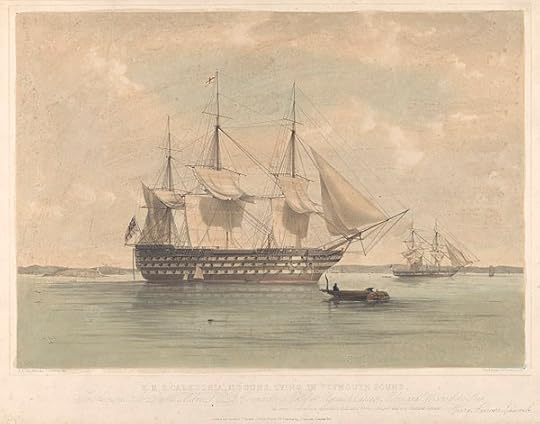 The HMS Caledonia was a 120-gun first-rate ship of the line of the Royal Navy, launched on 25 June 1808 at Plymouth. Wikipedia.
The HMS Caledonia was a 120-gun first-rate ship of the line of the Royal Navy, launched on 25 June 1808 at Plymouth. Wikipedia.April 25, 1811 Letter: Sloane Street
Austen’s progress with and thoughts about Sense and Sensibility: “No, indeed, I am never too busy to think of S. and S. I can no more forget it than a mother can forget her sucking child; and I am much obliged to you for your inquiries. I have had two sheets to correct, but the last only brings us to Willoughby’s first appearance. Mrs. K. regrets in the most flattering manner that she must wait till May, but I have scarcely a hope of its being out in June. Henry does not neglect it; he has hurried the printer, and says he will see him again to-day. It will not stand still during his absence, it will be sent to Eliza.”Plenty of wonderful details about a party hosted by Henry and Eliza: “Including everybody we were sixty-six — which was considerably more than Eliza had expected, and quite enough to fill the back drawing-room and leave a few to be scattered about in the other and in the passage.”“The music was extremely good. It opened (tell Fanny) with ‘Poike de Parp pirs praise pof Prapela’; and of the other glees I remember, ‘In peace love tunes,’ ‘Rosabelle,’ ‘The Red Cross Knight,’ and ‘Poor Insect.’ Between the songs were lessons on the harp, or harp and pianoforte together; and the harp-player was Wiepart, whose name seems famous, though new to me. There was one female singer, a short Miss Davis, all in blue, bringing up for the public line, whose voice was said to be very fine indeed; and all the performers gave great satisfaction by doing what they were paid for, and giving themselves no airs. No amateur could be persuaded to do anything.”“The house was not clear till after twelve. If you wish to hear more of it, you must put your questions, but I seem rather to have exhausted than spared the subject.”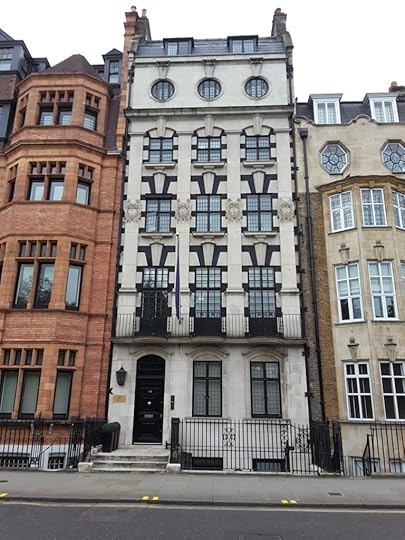 64 Sloane Street in London. Photo Credit: © Ingrid M Wallenborg, GuideLondon.org.April in Jane Austen’s Novels
64 Sloane Street in London. Photo Credit: © Ingrid M Wallenborg, GuideLondon.org.April in Jane Austen’s NovelsThe following are a collection of interesting details and scenes that occur in (or refer to) the month of April in Austen’s novels. Springtime appears to be a good time for travel, walking, and riding as the weather slowly improves:
Sense and Sensibility
The Palmers, Mrs. Jennings, and the Dashwood sisters leave London for Cleveland in April (for the Easter holidays): “Very early in April, and tolerably early in the day, the two parties from Hanover Square and Berkeley Street set out from their respective homes, to meet, by appointment, on the road. For the convenience of Charlotte and her child, they were to be more than two days on their journey, and Mr. Palmer, travelling more expeditiously with Colonel Brandon, was to join them at Cleveland soon after their arrival.”Pride and Prejudice
Darcy proposes again and refers to his first April proposal to Elizabeth Bennet (he surely remembers that date VERY well): “You are too generous to trifle with me. If your feelings are still what they were last April, tell me so at once. My affections and wishes are unchanged; but one word from you will silence me on this subject for ever.”https://youtube.com/watch?v=RNM6L9Bl2...Mansfield Park
Fanny is left without fitting exercise: “[The Miss Bertrams] took their cheerful rides in the fine mornings of April and May; and Fanny either sat at home the whole day with one aunt, or walked beyond her strength at the instigation of the other: Lady Bertram holding exercise to be as unnecessary for everybody as it was unpleasant to herself; and Mrs. Norris, who was walking all day, thinking everybody ought to walk as much.”Sir Thomas’s letter home: “[Sir Thomas] wrote in April, and had strong hopes of settling everything to his entire satisfaction, and leaving Antigua before the end of the summer.”Fanny Price in Portsmouth: “The end of April was coming on; it would soon be almost three months, instead of two, that she had been absent from them all, and that her days had been passing in a state of penance, which she loved them too well to hope they would thoroughly understand; and who could yet say when there might be leisure to think of or fetch her?”Fanny’s thoughts on springtime in the countryside versus the congested town: “It was sad to Fanny to lose all the pleasures of spring. She had not known before what pleasures she had to lose in passing March and April in a town. She had not known before how much the beginnings and progress of vegetation had delighted her. What animation, both of body and mind, she had derived from watching the advance of that season which cannot, in spite of its capriciousness, be unlovely, and seeing its increasing beauties from the earliest flowers in the warmest divisions of her aunt’s garden, to the opening of leaves of her uncle’s plantations, and the glory of his woods. To be losing such pleasures was no trifle; to be losing them, because she was in the midst of closeness and noise, to have confinement, bad air, bad smells, substituted for liberty, freshness, fragrance, and verdure, was infinitely worse: but even these incitements to regret were feeble, compared with what arose from the conviction of being missed by her best friends, and the longing to be useful to those who were wanting her!Northanger Abbey
Isabella writes a “very unexpected letter” to Catherine.Emma
Mrs. Elton pressures Jane to find a position as a governess very soon so that she doesn’t miss her chance: “But, my dear child, the time is drawing near; here is April, and June, or say even July, is very near, with such business to accomplish before us. Your inexperience really amuses me! A situation such as you deserve, and your friends would require for you, is no everyday occurrence, is not obtained at a moment’s notice; indeed, indeed, we must begin inquiring directly.”For the introverts among us: “John Knightley only was in mute astonishment.—That a man (Mr. Weston) who might have spent his evening quietly at home after a day of business in London, should set off again, and walk half a mile to another man’s house, for the sake of being in mixed company till bed-time, of finishing his day in the efforts of civility and the noise of numbers, was a circumstance to strike him deeply. A man who had been in motion since eight o’clock in the morning, and might now have been still, who had been long talking, and might have been silent, who had been in more than one crowd, and might have been alone!—Such a man, to quit the tranquillity and independence of his own fireside, and on the evening of a cold sleety April day rush out again into the world!“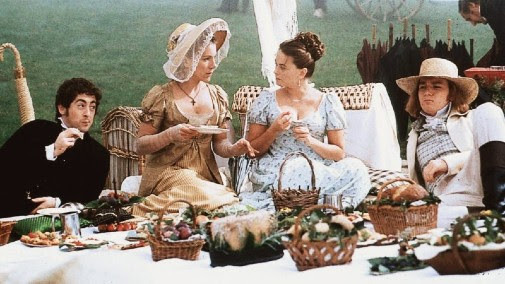 Mrs. Elton and Jane Fairfax in Emma (1996).April Dates of Importance
Mrs. Elton and Jane Fairfax in Emma (1996).April Dates of ImportanceThis brings us now to several dates that would have been important to Austen personally and to the Austen family as a whole:
Family News:
26 April 1764: Rev. George Austen marries Cassandra Leigh.
23 April 1774: Francis (Frank) Austen (Jane’s brother) born at Steventon.
April 1786: Francis Austen enters the Royal Naval Academy at Portsmouth
15 April 1793: James Austen’s first child, Anna, is born.
Historic Dates:
19 April 1775: The Battle of Lexington marks the start of America’s Revolutionary War.
Writing:
April 1811: Austen continues to correct proofs of Sense and Sensibility. She anticipates its publication date.
Sorrows:
22 April 1813: Eliza de Feuillide (Austen’s cousin and, later, sister-in-law) ill. Jane Austen goes to her bedside in London to help attend to her.
25 April 1813: Eliza de Feuillide dies.
27 April 1817: Austen drafts her will:
“I Jane Austen of the Parish of Chawton do by this my last Will & Testament give and bequeath to my dearest Sister Cassandra Elizth everything of which I may die possessed, or which may be hereafter due to me, subject to the payment of my Funeral Expences, & to a Legacy of £50. to my Brother Henry, & £50. to Mde Bigeon–which I request may be paid as soon as convenient. And I appoint my said dear Sister the Executrix of this my last Will & Testament.”
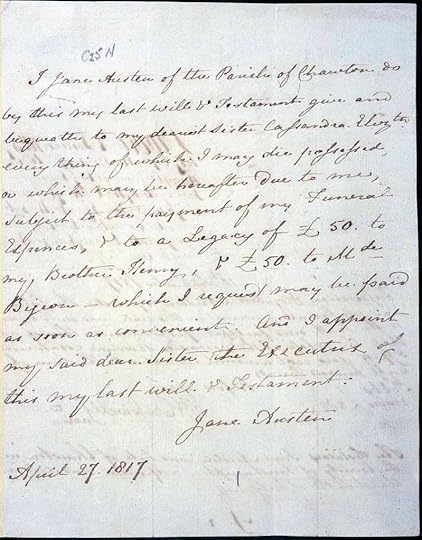 National ArchivesApril Showers
National ArchivesApril ShowersAs we continue through the year, one of the highlights for me has been surveying the photos of the gardens at Chawton House and Jane Austen’s House each month and seeing the changes therein. I hope these April showers will bring many beautiful May flowers for us to see next month as we continue our tour of Hampshire in the spring!
The post April in Jane Austen’s World first appeared on Rachel Dodge.
March 18, 2024
Austen in Bloom
For years, I’ve loved the Penguin Random House “Puffin in Bloom” editions of Anne of Green Gables, Heidi, Little Women, and A Little Princess. I typically purchase these gorgeous books as gifts for my bookish friends and their daughters.
Now, the Puffin in Bloom line has expanded to include three of Jane Austen’s novels as well!
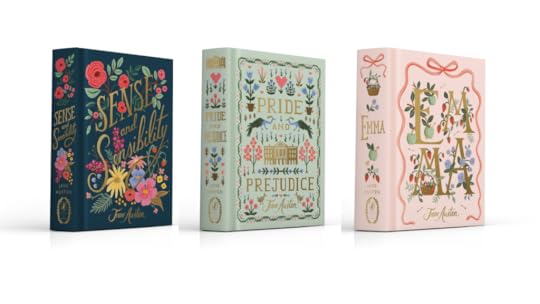 Delectable Classic Covers
Delectable Classic CoversThe Puffin in Bloom line started with four classic, coming-of-age novels: Anne of Green Gables, Heidi, Little Women, and A Little Princess. These hardcover classics feature floral cover illustrations by Anna Bond, the creative director and artistic inspiration behind the global stationery phenomenon Rifle Paper Co. Puffin in Bloom became an instant success and the original foursome continues to fly off the shelves. Classics novels with such beautiful covers do not disappoint!
Each book can be purchased individually or as a boxed set in a beautiful keepsake box. These hardcover books don’t just boast a pretty cover; they look and feel great in your hands. They are just the right size and they read well. I am very particular about the feel of a book in my hands, and these are a joy to hold and read. You can easily slip them into a purse or tote to take with you, too!

 Alice’s Adventures in Wonderland
Alice’s Adventures in WonderlandTo commemorate the 150th anniversary of Alice’s Adventures in Wonderful by Lewis Carroll, Puffin Books added to the Puffin in Bloom line and released a deluxe, hardcover gift edition of the famous novel. Once again, the talented Anna Bond created the cover illustration, and she also provided full-color illustrations inside. The result is exquisite!
“In this beautiful edition, Alice’s story comes to life for a whole new generation of readers through the colorful, whimsical artwork of Anna Bond, best known as the creative director and artistic inspiration behind the worldwide stationery and gift brand Rifle Paper Co.”

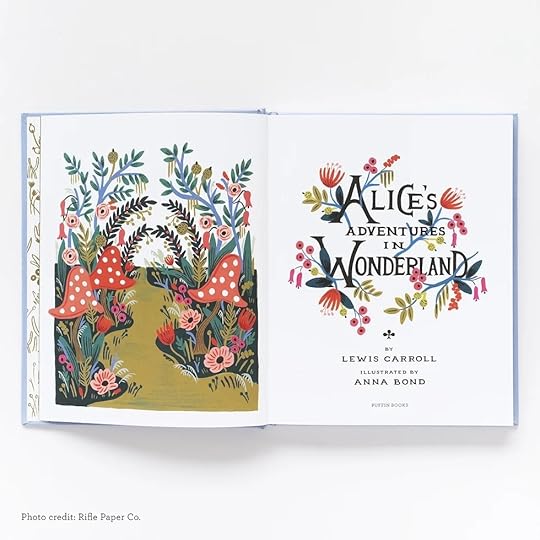 Jane Austen in Bloom
Jane Austen in BloomAfter years of waiting and wondering (and wishing), I was overjoyed when Penguin announced last year that they were planning to expand the Puffin in Bloom line to include other classics as well. Again, they chose Anna Bond to create new cover art with her signature style. But best of all, they chose our Jane’s cherished novels for this new endeavor!!
This first installment (I truly hope there will be more) includes Austen’s Pride and Prejudice, Sense and Sensibility, and Emma. Let’s take a closer look:
 Pride and Prejudice
Pride and Prejudice
Though her sisters are keen on finding men to marry, Elizabeth Bennet would rather wait for someone she loves – certainly not someone like Mr. Fitzwilliam Darcy, whom she finds to be smug and judgmental, in contrast to the charming George Wickham. But soon Elizabeth learns that her first impressions may not have been correct, and the quiet, genteel Mr. Darcy might be her true love after all. You can view and purchase HERE.
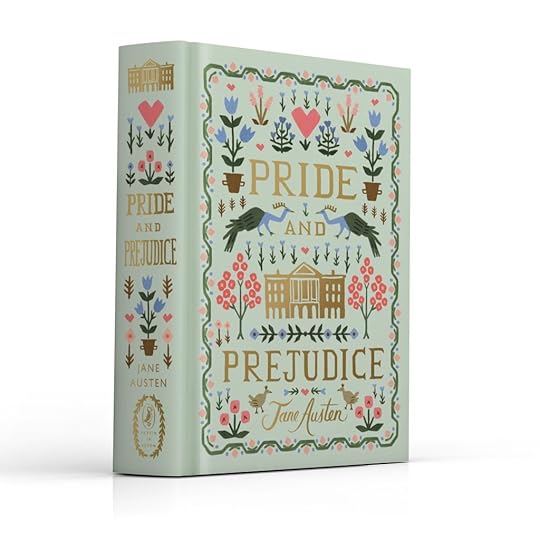 Sense and Sensibility
Sense and Sensibility
Book Description: “Marianne Dashwood wears her heart on her sleeve, and when she falls in love with the dashing but unsuitable John Willoughby, she ignores her sister Elinor‘s warning that her impulsive behavior leaves her open to gossip and innuendo. Meanwhile Elinor, always sensitive to social convention, is struggling to conceal her own romantic disappointment, even from those closest to her. Through their parallel experience of love– and its threatened loss–the sisters learn that sense must mix with sensibility if they are to find personal happiness in a society where status and money govern the rules of love.” You can view and purchase HERE.
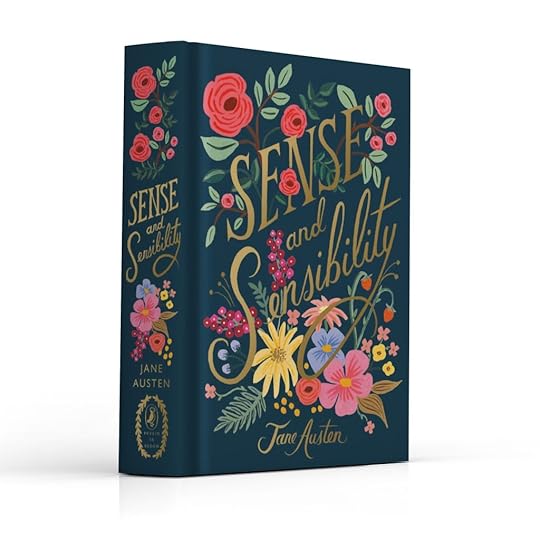 Emma
Emma
Book Description: “Emma Woodhouse believes herself to be an excellent matchmaker, though she herself does not plan on marrying. But as she meddles in the relationships of others, she causes confusion and misunderstandings throughout the village, and she just may be overlooking a true love of her own.” You can view and purchase HERE.
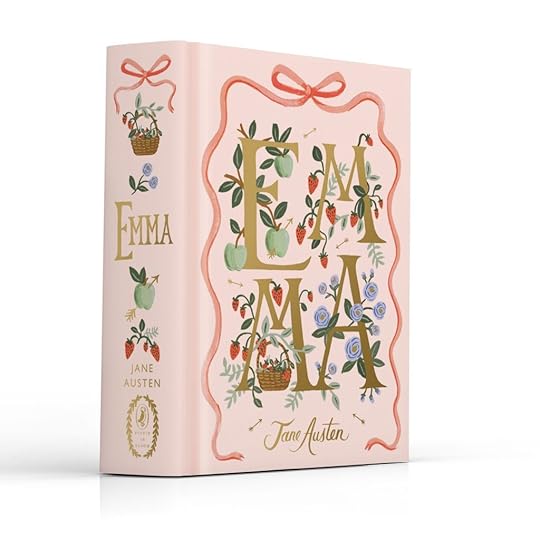 Anna Bond
Anna BondAnna Bond is co-founder and CCO of Rifle Paper Co., an international stationery and lifestyle brand with offices in Winter Park, Florida and New York City. Originally from Summit, New Jersey, Anna trained as a graphic designer and made her way to Florida to work as a senior art director at a media company at age 21. After a year of working in print design she left to pursue her passion in illustration. A number of gig posters and freelance work later, she re-discovered her lifelong love of stationery through wedding invitation design and the idea for a stationery collection was born.
Together with her husband Nathan, Anna launched Rifle Paper Co. based out of their apartment in November 2009 and the brand has quickly grown to become of the most notable brands in the industry. Every one of Rifle’s over 900 products are designed by Anna and feature her signature hand-painted illustrations, vibrant color palette, and whimsical tone which has helped propel the brand’s success. Rifle Paper Co. now employs over 200 people and is carried in over 5,000 stores around the world including Anthropologie, MoMA and Barnes & Noble. You can see more of Anna’s work HERE.
 Collecting Austen Covers
Collecting Austen CoversWith covers like these, who can resist “just one more” edition of Austen’s beloved novels? I know many of us have shelves with several pretty editions, plus a favorite, worn-in version that we keep close by for regular reading. Do you have several editions of Austen’s novels? Which books do you collect and how many do you have so far?
The post Austen in Bloom first appeared on Rachel Dodge.
Books That Feel Like Home
What books are like coming home for you? Don’t you just love this Alcott quote? She created a book that truly feels like coming home!

Little Women is definitely at the top of my “feels like home” list. Along with Anne of Green Gables, Little House on the Prairie, The Secret Garden, and so many others! I’ve read some books so many times, it feels like I’m walking in the door to spend time with the characters.
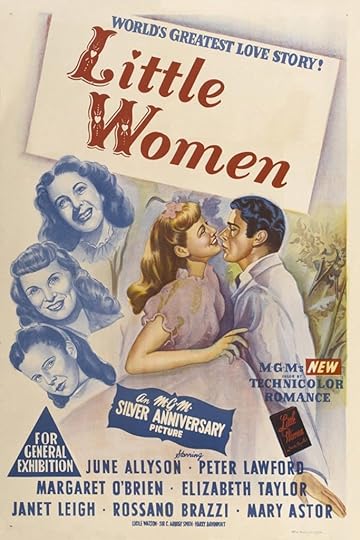
For Little Women, I love the book, but I love watching the movies even more! Just hearing the music from the 1994 (Winona Ryder/Christian Bale) version makes me teary! It’s so homey and happy and nostalgic for me.
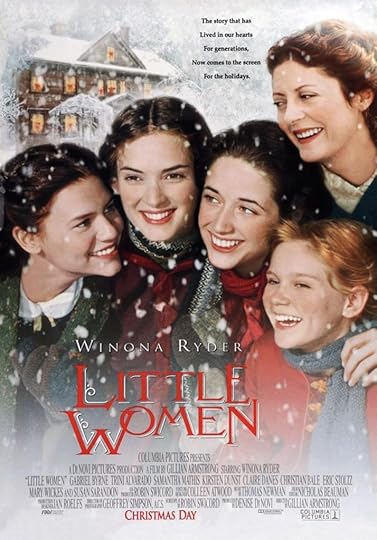
Do you have a favorite movie version of Little Women? Did you like the newest one? Depending on where we all fall in terms of age/era (Boomers, Gen X, Millennials, Gen Z), I’m sure we all have different opinions!!
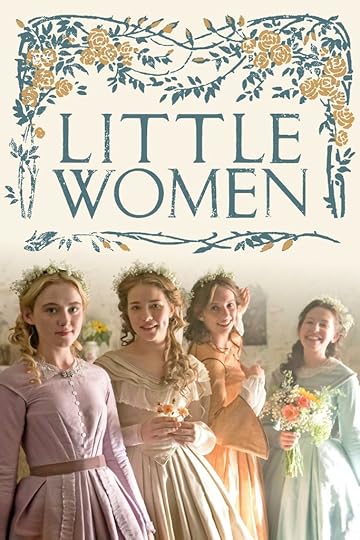

I personally LOVE the 1994 version best. It is like HOME to me! But I can appreciate every version because I love the characters and the story so much.
Here’s to cozy books and movies, Kindred Spirits!
Rachel xx
The post Books That Feel Like Home first appeared on Rachel Dodge.
March 14, 2024
March in Jane Austen’s World
This year I’ve embarked on a new series that focuses on important details that happened in Jane Austen’s novels, letters, and lifetime during each month of the year. Each month, I share with you my findings as I scour her letters, novels, and personal and family history.
Thus far, we’ve covered January and February and learned a lot about the “Season” in London and Bath during the winter months during the Regency Era, as well as the garden the Austen women planned for their Southampton home during their first winter there.
Next, we turn to March in Austen’s novels. While January and February were still quite wintry, March in the south of England is a mix of weather and season. As always happens, this type of research is a “follow your nose”-type study – let’s see where March will take us!
March in HampshireThe daffodils like to put on a good show at Jane Austen’s House Museum and Chawton House this time of year. The yellow pops of color are good for the soul and prove to be a hopeful sign that spring is on its way, to those who visit the grounds this time of year.
The daffodils in my yard are glorious right now and it makes my heart happy. I planted 250 bulbs last fall, which meant a lot of work … without anything to show for it at the time. But now that it’s spring, I’m seeing the fruit of my labors!
Daffodils and the like are a wonderful reminder that many worthwhile projects and tasks take work and time before we see fruit. In Austen’s life, before she was published, only her family and close friends enjoyed her work. But later, there was an abundance of fruit from her labors–and it continues to this day!
 Daffodils at Chawton House in March, @ChawtonHouse.March in Jane Austen’s Letters
Daffodils at Chawton House in March, @ChawtonHouse.March in Jane Austen’s LettersSeveral of Austen’s surviving letters were written in March or about March. Here are some interesting highlights:
1814: We have several letters from Jane to Cassandra from March 1814, when Austen visited her brother Henry at his house in Henrietta Street in Covent Garden (you can read more here).
These letters give us a glimpse into Jane’s mind about London, the weather that winter, shopping for herself and the other women in her family, her brother Henry’s thoughts on Mansfield Park, and the plays they attended (several that she liked and others she did not).
Wednesday, 2 March (Henrietta Street):
Henry’s thoughts on MP: “We did not begin reading till Bentley Green. Henry’s approbation is hitherto even equal to my wishes. He says it is different from the other two, but does not appear to think it at all inferior. He has only married Mrs. R. (Rushworth). I am afraid he has gone through the most entertaining part. He took to Lady B. (Bertram) and Mrs. N. (Norris) most kindly, and gives great praise to the drawing of the characters. He understands them all, likes Fanny, and, I think, foresees how it will all be.”More on that topic: “Henry is going on with ‘Mansfield Park.’ He admires H. Crawford: I mean properly, as a clever, pleasant man.”Austen’s thoughts on reading The Heroine: “We have drank tea, and I have torn through the third vol. of the ‘Heroine.’ I do not think it falls off. It is a delightful burlesque, particularly on the Radcliffe style.” (The Heroine; Or Adventures of Cherubina is a novel by Eaton Stannard Barrett, 1813).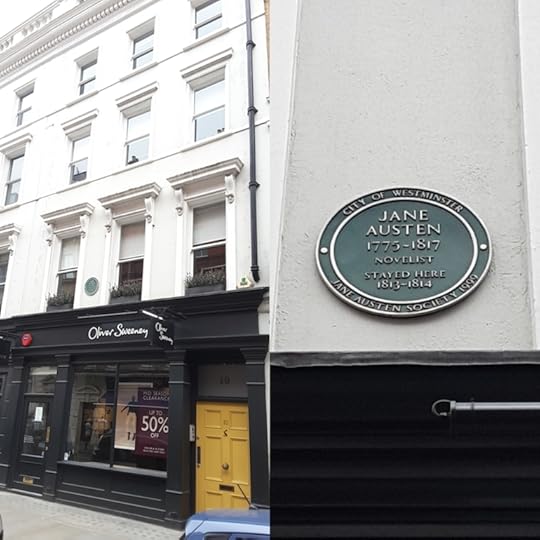 Henrietta Street today, GuideLondon.org.
Henrietta Street today, GuideLondon.org.Saturday, 5 March (Henrietta Street):
In this letter, Austen provides short accounts from several different days in one week. She provides news each day for Saturday, Sunday, Monday, and Tuesday:
The weather seems quite uncomfortable: “Do not be angry with me for beginning another letter to you. I have read the ‘Corsair’ (Byron), mended my petticoat, and have nothing else to do. Getting out is impossible. It is a nasty day for everybody. Edward’s spirits will be wanting sunshine, and here is nothing but thickness and sleet; and though these two rooms are delightfully warm, I fancy it is very cold abroad.”She attends several plays at the Theatre Royal in Drury Lane, London. On Saturday, March 5, 1814, she sees Edmund Kean as Shylock in William Shakespeare’s The Merchant of Venice and provides her thoughts: “We were quite satisfied with Kean. I cannot imagine better acting, but the part was too short; and, excepting him and Miss Smith, and she did not quite answer my expectation, the parts were ill filled and the play heavy. We were too much tired to stay for the whole of “Illusion” (“Nour-jahad”), which has three acts; there is a great deal of finery and dancing in it, but I think little merit. Elliston was “Nour-jahad,” but it is a solemn sort of part, not at all calculated for his powers. There was nothing of the best Elliston about him. I might not have known him but for his voice.”Later, she continues with this: “I shall like to see Kean again excessively, and to see him with you too. It appeared to me as if there were no fault in him anywhere; and in his scene with “Tubal” there was exquisite acting.”She writes more about Henry’s assessment of Mansfield Park: “Henry has this moment said that he likes my M. P. better and better; he is in the third volume. I believe now he has changed his mind as to foreseeing the end; he said yesterday, at least, that he defied anybody to say whether H. C. [Henry Crawford] would be reformed, or would forget Fanny in a fortnight.”Her thoughts on the increase in the price of tea: “A cold day, but bright and clear. I am afraid your planting can hardly have begun. I am sorry to hear that there has been a rise in tea. I do not mean to pay Twining till later in the day, when we may order a fresh supply.”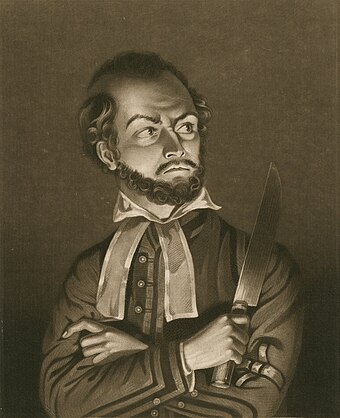 Edward Kean as Shylock (Wiki Commons).
Edward Kean as Shylock (Wiki Commons).
 Theatre Royal in Drury Lane, sketched when it was newly built, in 1813 (Wiki Commons).
Theatre Royal in Drury Lane, sketched when it was newly built, in 1813 (Wiki Commons).Wednesday, 9 March (Henrietta Street):
Jane Austen and her mother and Martha Lloyd all have winter colds: “I have a cold, too, as well as my mother and Martha. Let it be a generous emulation between us which can get rid of it first.” And later: “We are home in such good time that I can finish my letter to-night, which will be better than getting up to do it to-morrow, especially as, on account of my cold, which has been very heavy in my head this evening, I rather think of lying in bed later than usual. I would not but be well enough to go to Hertford St. on any account.”Austen’s dress: “I wear my gauze gown to-day, long sleeves and all. I shall see how they succeed, but as yet I have no reason to suppose long sleeves are allowable. I have lowered the bosom, especially at the corners, and plaited black satin ribbon round the top. Such will be my costume of vine-leaves and paste.” And later: “Mrs. Tilson had long sleeves, too, and she assured me that they are worn in the evening by many. I was glad to hear this.”And Henry’s final thoughts on Mansfield Park: “Henry has finished ‘Mansfield Park,’ and his approbation has not lessened. He found the last half of the last volume extremely interesting.”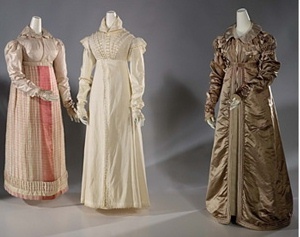 Long-sleeved Regency gowns.
Long-sleeved Regency gowns.1816: Letters to Fanny Knight
Austen’s romantic advice: “To you I shall say, as I have often said before, Do not be in a hurry, the right man will come at last; you will in the course of the next two or three years meet with somebody more generally unexceptionable than anyone you have yet known, who will love you as warmly as possible, and who will so completely attach you that you will feel you never really loved before.”Notes on writing: “I will answer your kind questions more than you expect. “Miss Catherine” (Northanger Abbey) is put upon the shelf for the present, and I do not know that she will ever come out; but I have a something ready for publication (Persuasion), which may, perhaps, appear about a twelvemonth hence. It is short — about the length of ‘Catherine.’ This is for yourself alone. Neither Mr. Salusbury nor Mr. Wildman is to know of it.”Illness: “I am got tolerably well again, quite equal to walking about and enjoying the air, and by sitting down and resting a good while between my walks, I get exercise enough. I have a scheme, however, for accomplishing more, as the weather grows spring-like. I mean to take to riding the donkey; it will be more independent and less troublesome than the use of the carriage, and I shall be able to go about with Aunt Cassandra in her walks to Alton and Wyards.”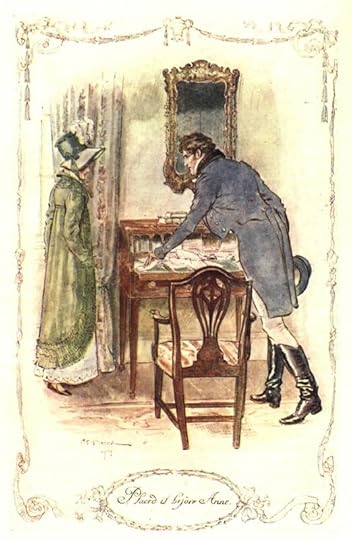
In this letter, Austen speaks of many other topics, but the state of her health seems to be the most important topic in this letter:
“Many thanks for your kind care for my health; I certainly have not been well for many weeks, and about a week ago I was very poorly. I have had a good deal of fever at times, and indifferent nights; but I am considerably better now and am recovering my looks a little, which have been bad enough — black and white, and every wrong colour. I must not depend upon being ever very blooming again. Sickness is a dangerous indulgence at my time of life. Thank you for everything you tell me. I do not feel worthy of it by anything that I can say in return, but I assure you my pleasure in your letters is quite as great as ever, and I am interested and amused just as you could wish me.”Evening: “I was languid and dull and very bad company when I wrote the above; I am better now, to my own feelings at least, and wish I may be more agreeable. We are going to have rain, and after that very pleasant genial weather, which will exactly do for me, as my saddle will then be completed, and air and exercise is what I want. Indeed, I shall be very glad when the event at Scarlets is over, the expectation of it keeps us in a worry, your grandmamma especially; she sits brooding over evils which cannot be remedied, and conduct impossible to be understood.”“I took my first ride yesterday, and liked it very much. I went up Mounter’s Lane and round by where the new cottages are to be, and found the exercise and everything very pleasant; and I had the advantage of agreeable companions, as At. Cass. and Edward walked by my side. At. Cass. is such an excellent nurse, so assiduous and unwearied! But you know all that already.”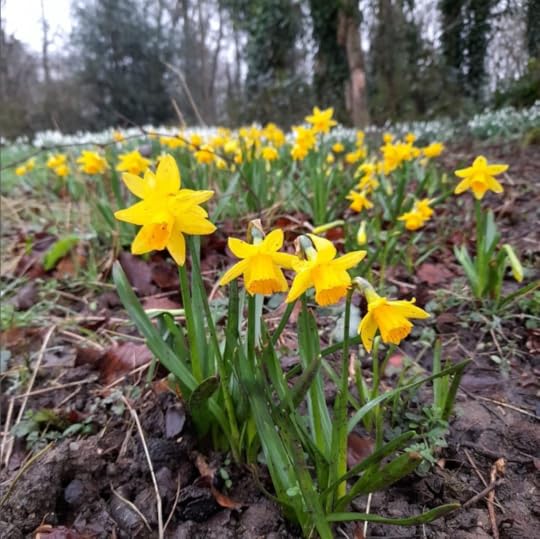 March in Jane Austen’s Novels
March in Jane Austen’s NovelsThe following are a collection of interesting little tidbits and important moments from Austen’s novels:
Sense and Sensibility
“The third day … was so fine, so beautiful a Sunday as to draw many to Kensington Gardens, though it was only the second week in March. Mrs. Jennings and Elinor were of the number; but Marianne, who knew that the Willoughbys were again in town, and had a constant dread of meeting them, chose rather to stay at home, than venture into so public a place.” While walking, Elinor meets Miss Steele (Anne) who says Edward tried to persuade Lucy to give up their engagement, but that Lucy has said she never will.In that same chapter, a letter arrives: “The next morning brought Elinor a letter by the two-penny post from Lucy herself” (from Bartlett’s Building). In this letter, Lucy claims that she tried to persuade Edward to give her up, but “he would not hear of [their] parting.”In the next chapter, we read this: “The Palmers were to remove to Cleveland about the end of March, for the Easter holidays; and Mrs. Jennings, with both her friends, received a very warm invitation from Charlotte to go with them.” Elinor and Marianne, both for different reasons, don’t want to go, but they are persuaded to go because going to Cleveland will mean they are only “a long day’s journey” from Barton and can soon go home.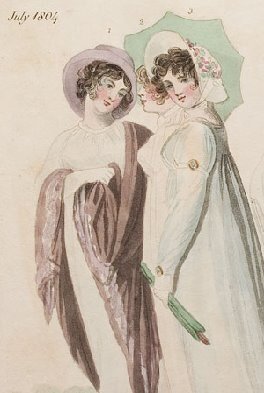 Promenade in Kensington Gardens, 1804.
Promenade in Kensington Gardens, 1804.Pride and Prejudice
“March was to take Elizabeth to Hunsford. She had not at first thought very seriously of going thither; but Charlotte, she soon found, was depending on the plan,{190} and she gradually learned to consider it herself with greater pleasure as well as greater certainty. Absence had increased her desire of seeing Charlotte again, and weakened her disgust of Mr. Collins. There was novelty in the scheme; and as, with such a mother and such uncompanionable sisters, home could not be faultless, a little change was not unwelcome for its own sake. The journey would, moreover, give her a peep at Jane; and, in short, as the time drew near, she would have been very sorry for any delay. Everything, however, went on smoothly, and was finally settled according to Charlotte’s first sketch. She was to accompany Sir William and his second daughter. The improvement of spending a night in London was added in time, and the plan became as perfect as plan could be.”Mansfield Park
It’s in March that Mr. Crawford visits Fanny in Portsmouth. First, they go to church: “The Prices were just setting off for church the next day when Mr. Crawford appeared again. He came, not to stop, but to join them; he was asked to go with them to the Garrison chapel, which was exactly what he had intended, and they all walked thither together.”Then, on a walk: “The day was uncommonly lovely. It was really March; but it was April in its mild air, brisk soft wind, and bright sun, occasionally clouded for a minute; and everything looked so beautiful under the influence of such a sky, the effects of the shadows pursuing each other on the ships at Spithead and the island beyond, with the ever-varying hues of the sea, now at high water, dancing in its glee and dashing against the ramparts with so fine a sound, produced altogether such a combination of charms for Fanny, as made her gradually almost careless of the circumstances under which she felt them.”Later, we read these poignant thoughts from Anne on missing spring in the countryside: “It was sad to Fanny to lose all the pleasures of spring. She had not known before what pleasures she had to lose in passing March and April in a town. She had not known before how much the beginnings and progress of vegetation had delighted her. What animation, both of body and mind, she had derived from watching the advance of that season which cannot, in spite of its capriciousness, be unlovely, and seeing its increasing beauties from the earliest flowers in the warmest divisions of her aunt’s garden, to the opening of leaves of her uncle’s plantations, and the glory of his woods. To be losing such pleasures was no trifle; to be losing them, because she was in the midst of closeness and noise, to have confinement, bad air, bad smells, substituted for liberty, freshness, fragrance, and verdure, was infinitely worse: but even these incitements to regret were feeble, compared with what arose from the conviction of being missed by her best friends, and the longing to be useful to those who were wanting her!” Fanny Price in Portsmouth, Mansfield Park, Folio Society, illustrated by Joan Hassall.
Fanny Price in Portsmouth, Mansfield Park, Folio Society, illustrated by Joan Hassall.Persuasion
According to the Baronetage in Persuasion, a very important man (in his own estimation) was born in March: “ELLIOT OF KELLYNCH HALL: Walter Elliot, born March 1, 1760…”Northanger Abbey
“[Catherine] was struck, however, beyond her expectation, by the grandeur of the abbey, as she saw it for the first time from the lawn. The whole building enclosed a large court; and two sides of the quadrangle, rich in Gothic ornaments, stood forward for admiration. The remainder was shut off by knolls of old trees, or luxuriant plantations, and the steep woody hills rising behind, to give it shelter, were beautiful even in the leafless month of March. Catherine had seen nothing to compare with it; and her feelings of delight were so strong, that without waiting for any better authority, she boldly burst forth in wonder and praise. The general listened with assenting gratitude; and it seemed as if his own estimation of Northanger had waited unfixed till that hour.” Lismore Castle was used for the 2007 Northanger Abbey film adaptation.March Dates of Importance
Lismore Castle was used for the 2007 Northanger Abbey film adaptation.March Dates of ImportanceThis brings us now to several dates that would have been important to Austen personally and to the Austen family as a whole:
Family News:
23 March 1773: Rev. Austen becomes rector of Deane parish (in addition to Steventon).
27 March 1792: James Austen marries Anne Mathew (they move into the parsonage in Deane).
25 March 1805: Mrs. Austen and her daughters move to 25 Gay Street, Bath.
Historic Dates:
11 March 1793: Civil war erupts in France.
Writing:
March 1811: Austen corrects proofs of Sense and Sensibility.
29 March 1815: Emma finished.
Sorrows:
January-March 1816: Austen begins work on Sanditon.
Spring 1816: Jane Austen begins to feel ill.
18 March 1816: Austen ceases work on Sanditon.
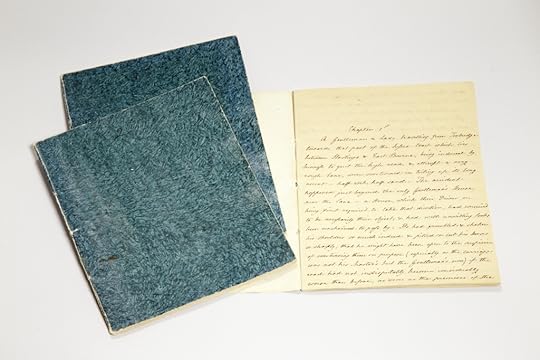 Cassandra’s handwritten copy of Sanditon, JaneAusten’s.House.March in the Life of Austen
Cassandra’s handwritten copy of Sanditon, JaneAusten’s.House.March in the Life of AustenI hope you enjoyed this month’s overview of March in Jane Austen’s World. As always, there is so much more to explore! These are merely highlights and snippets. In some instances, the information I found was a tad contradictory, so I did my best to find the most accurate research available. If you have more information on any topic, feel free to share in the comments. Next up: April!
The post March in Jane Austen’s World first appeared on Rachel Dodge.



